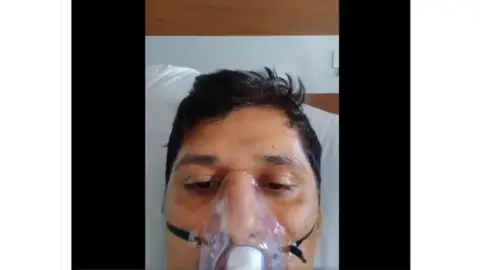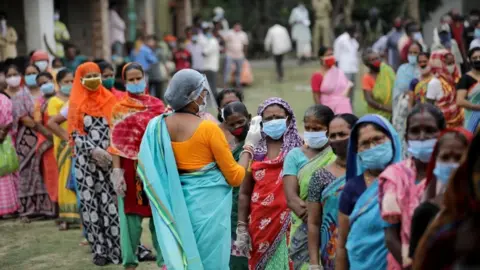Covid-19: Delhi hospitals run out of oxygen supplies
At least two hospitals in the Indian capital of Delhi are running out of oxygen, amid a healthcare crisis gripping several states.
A number of people have died while waiting for oxygen supplies, and the majority of intensive care beds in Delhi hospitals are full.
India is in the grips of a second wave of Covid infections.
It has close to 16 million confirmed infections and registered a record number of cases on Thursday.
Prime Minister Narendra Modi is due to hold meetings with the chief ministers of affected states and oxygen manufacturers on Friday.
In a tweet labelled "SOS" sent out on Friday morning, Max Healthcare said it had been waiting for expected fresh supplies for more than seven hours at two hospitals. It has 700 patients admitted at the two facilities.
In recent days, several other hospitals in Delhi had said they had either run out of oxygen or their supplies were dwindling rapidly.
Allow X content?

Three other states - Gujarat, Uttar Pradesh, and Haryana - are also facing a critical shortage of oxygen, while other states like Maharashtra are seeing depleting supplies.
On Thursday India recorded the highest one-day tally of new cases anywhere in the world.
There were 314,835 new coronavirus cases during the previous 24 hours, while deaths rose by 2,104.
There have been reports of state authorities stopping oxygen tankers from travelling to other states, according to Delhi television station NDTV. Some facilities have been accused of hoarding their supplies.
Indian politician, Saurabh Bharadwaj, who is being treated in a Delhi hospital for Covid, posted a plea for help in Hindi on Twitter, saying there were just three hours of oxygen left where he was.
 Saurabh Bharadwaj
Saurabh Bharadwaj"A lot of people are dependent on oxygen and without oxygen, these people will die just like fish die in the absence of water," he said. "This is a time for all to come together to work."
Delhi is known to have among the best healthcare facilities in India, but it has been brought to its knees by the latest surge in cases, says BBC India correspondent Yogita Limaye.
Families are also waiting hours to perform funeral rites, Reuters news agency reports, with at least one Delhi crematorium resorting to building pyres in its car park in order to cope with the numbers arriving. Crematoriums are holding mass cremations, and working day and night in several cities.
"During the first phase of coronavirus, the average here was eight to 10. One day it reached 18. But today the situation is very bad. Last night we cremated 78 bodies," Jitender Singh Shunty, who runs a crematorium in northeast Delhi, told Reuters.
"It is four times more frightful, this coronavirus... Many bodies are around, waiting. We have no place left in the crematorium to cremate them. Very bad times, very bad times," he added.
A doctor working in a government hospital in the south of India, who wished to remain anonymous, said tensions were running high.
"Patients are trying to hit doctors," they told the BBC. "They are blaming doctors for everything and even the [hospital] management is also blaming the doctors. It's a stressful environment."
"We have presently almost used 99% of oxygen ports - only 1% is left. It's a very pathetic situation."

 EPA
EPAA travel ban has taken effect in the UK for visitors from India. British and Irish citizens will still be allowed to enter the UK but will have to stay in a government-appointed quarantine hotel for ten days.
Canada and United Arab Emirates (UAE) have temporarily suspended passenger flights, while Singapore has tightened restrictions on travellers from India.

One family's story
Sukhbinder Singh, who lives in Leicester in the UK, told the BBC that his mother, 90-year-old Harbans Kaur, died on Wednesday in Delhi after she and seven members of his family tested positive for Covid-19.
A nursing home refused to admit Ms Kaur without a family member to care for her, but no-one was well enough to do so and she had to stay at home.
"After several phone calls and pleading, I managed to organised the cremation through a charity for my mother, which was carried out with some usual rituals," he added. "But there were no final farewells by family and the memory of her death is very difficult to deal with mentally."
Mr Singh's brother and sister-in-law were admitted to hospital in Delhi, and using his contacts in India, he was finally able to secure the medicine and oxygen they needed - although he said he struggled in part because of rising medicine costs due to the black market.
"My lower-middle-class family is not rich to afford big private hospital fees and treatment costs. What about poor daily wagers who can't even afford paracetamol?"


How did it get so bad?
In January, the pandemic was comparatively controlled, but since then the situation has gone from bad to worse.
India has seen a rapid rise in case numbers over the past month driven by lax safety protocols, a Hindu festival attended by millions and variants of the virus, including a "double mutant" strain.
Political parties have come under criticism for holding huge state election rallies - including one by Prime Minister Narendra Modi - in West Bengal. The government has defended the decision to continue with polling, which is taking place in phases, but India's election body has now banned campaign rallies.
What action is being taken?
Prime Minister Modi chaired a high-level meeting on Thursday to discuss the oxygen supply issue. According to a government statement, he was told that an "elaborate exercise" is under way, with state governments to identify their needs so they can be supplied with oxygen.
To transport oxygen around the country faster, the canisters are being airlifted and put on direct trains, the statement says.
 EPA
EPAThere is no national lockdown currently in place, and regions are implementing their own rules.
Delhi announced a week-long lockdown at the weekend, leaving just government offices and essential services like hospitals, pharmacies and grocers open.
Tougher restrictions have been announced in the worst affected state of Maharashtra, which is India's richest region and home to its financial hub, Mumbai. It has also been a Covid hotspot since the start of the pandemic, accounting for a quarter of India's cases.
What is happening with the vaccine drive?
Despite a promising start in January, India's inoculation drive has been lagging.
Some 130 million doses have so far been administered, but with a population of more than a billion people, it is a small percentage, and the drive has been restricted to health workers, frontline staff, those above the age of 45 and anyone with co-morbidities.
Experts say India is unlikely to meet its target of covering 250 million people by July.
From 1 May, people above 18 will also be eligible for the vaccine. But there is a shortage of doses, which could slow it down further.

Are you affected by Covid-19 in India? Please share your story by emailing haveyoursay@bbc.co.uk.
Please include a contact number if you are willing to speak to a BBC journalist. You can also get in touch in the following ways:
- WhatsApp: +44 7756 165803
- Tweet: @BBC_HaveYourSay
- Please read our terms & conditions and privacy policy
If you are reading this page and can't see the form you will need to visit the mobile version of the BBC website to submit your question or comment or you can email us at HaveYourSay@bbc.co.uk. Please include your name, age and location with any submission.
